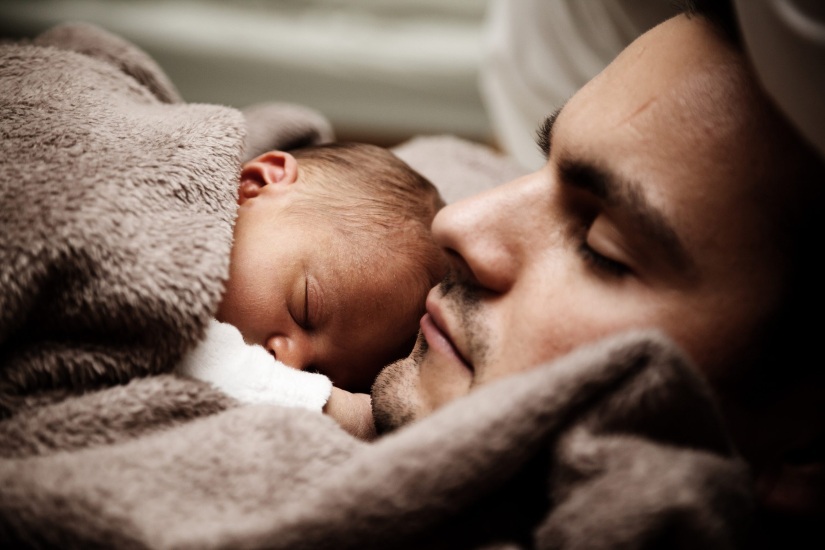Managing Adult Sleep With Baby on Board
Your new little bundle of joy is about to bring a huge bundle of change.
One of the biggest adjustments parents make with the arrival of a new baby is how to handle the change an infant will bring to adult sleep cycles. If you’re used to a solid eight hours, get ready for a new awakening.
Healthline.com provides an eye-opening snapshot of what happens to regular adult and caretaker routines and sleep cycles when a little one first arrives on the scene. Using data from a Sleep Junkie Survey, the study, among other things, reveals:
- Prior to a baby’s arrival, on average adults get about seven-plus hours of sleep per night.
- Once the baby has arrived, the average caretaker adult loses about 109 minutes of sleep per night. In a two-adult household, that represents a whopping 218 minutes of lost sleep per night which equates to more than three-and-a-half hours of sleep per evening. That certainly adds up by the end of the week, month, and year.
- Even during daytime hours, the routines of adult care providers change dramatically. The same survey indicates more than five hours per day are directly devoted to the care of a newborn. How is that time spent? Approximately one hour and forty-one minutes per day are devoted to feeding the baby. Other one-hour-and-twenty-one minutes are spent walking the baby. Thirty-four minutes a day are normally spent reading to baby, while the average parent pulls out all the stops in trying to get the baby asleep by spending 41 minutes driving baby around in the car, equivalent to a 20-mile road trip.
The sleep pattern adjustments adults make during that first year can be profound, especially since most babies move through four different sleep cycles themselves from birth through 12 months old.
Johns Hopkins Medicine provides a number of suggestions to help navigate sleep during a baby’s first year in New Parents: Tips for Quality Rest. Among the suggestions are limiting caffeine, putting down the electronic toys well before you yourself go to bed, and as much as possible, try to match adult sleep patterns with baby patterns. This might be the biggest challenge for care providers as newborns tend to nap in two-hour cycles and can sleep for as much as 16-18 hours a day in the early stages of growth and development. Other suggestions include:
- Don’t stress over routine household chores. Your rest and the baby’s rest should take priority, especially during the first year. So, if the house is a mess, but you and the baby are OK, pat yourself on the back.
- Place the baby’s crib or bassinet close to where you sleep so if you do have to awaken, it will be easier to fall back asleep once the baby has been tended to.
- Don’t be afraid to ask family and friends for help.
- If you are employed and your place of employment offers parental leave, take advantage of it. If you are in a two-adult household, it might be beneficial for one partner to take family leave shortly after birth, and for the other partner to take family leave weeks or months after the baby first comes home.

Brevard Health Alliance’s Monica Jackson, Physician Assistant at Palm Bay Pediatric Clinic, and the mother of young children herself, offers three suggestions learned from first-hand experience to best manage your new family landscape.
First, “Take breaks! It’s important for new parents to understand and appreciate the benefits of getting out of the house. A relaxing walk around the neighborhood, sunbathing on the patio for 15-30 minutes, getting that much-needed haircut, or even a trip to the grocery store can be enough to rejuvenate a sleep-deprived parent.”
Jackson adds that she often encourages new parents to take short outings and breaks from around-the-clock caregiving.
Second, “Know the difference between when you are tired and when you are TIRED. Feeling well-rested with a growing family is a real challenge,” acknowledges the PA.
If you can’t sleep when your baby sleeps, have difficulty functioning, feel overwhelmed or begin to lose interest in things you usually enjoy, this could be postpartum depression. Don’t hesitate to discuss these changes with your healthcare provider or a mental health professional.”
A third informational nugget offered by Jackson: Divide and conquer.
“If possible, take shifts. Having a newborn with a 17-month-old that was not yet sleeping through the night proved to be a personal challenge for me. My husband had the brilliant idea of taking shifts at night to ensure each of us got at least a four-to-five-hour block of uninterrupted sleep every night.
“I would pump enough for a few feedings, hand him the baby monitor for our 17-month-old, and slip away into another bedroom while he slept in our bedroom with the newborn. Then we’d switch at a four-or-five-hour interval.”
Jackson adds that family life during a period of transition like this might resemble a NASCAR pit crew, but it is manageable.
“My colleagues laugh at me when I brag about how I can take on the world having had only five hours of UNINTERRUPTED sleep. You’ll soon discover that having a newborn gives you superhuman powers!”
































































































































